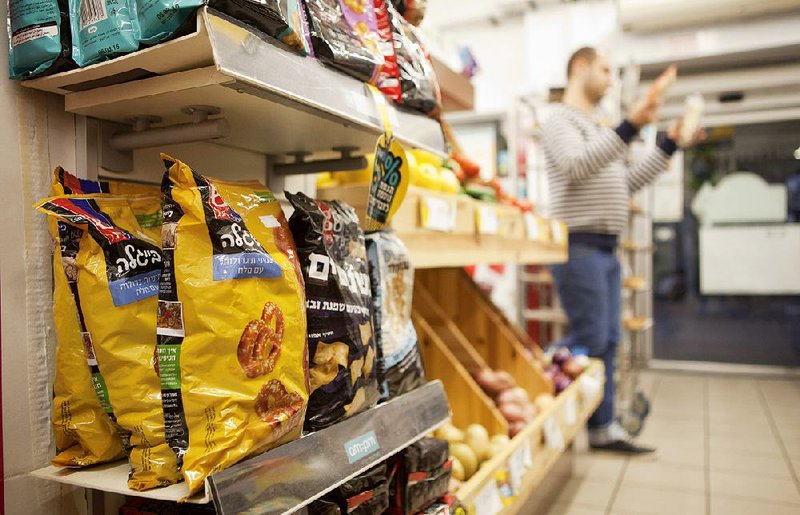JERUSALEM -- The European Union pushed ahead Wednesday with rules for labeling Israeli products made in the West Bank and areas captured by Israel during the 1967 Arab-Israeli war.
European officials played down the move, saying the guidelines merely clarified existing rules on goods sold in Europe. But Israeli politicians condemned it as an anti-Semitic echo of Holocaust-era practices.
The EU is Israel's top trading partner, although products from the occupied West Bank, Golan Heights and East Jerusalem are believed to comprise a small fraction of Israel's $14 billion in annual exports to the bloc's 28 countries.
The labeling rules are mandatory for producers of fresh fruit and vegetables, wine, honey, olive oil, eggs, poultry, organic products, and cosmetics moving from Israeli-owned businesses and farms outside the state's original borders.
Rather than "product of Israel," these goods must be labeled with the term "settlement," as in "product of West Bank (Israeli settlement)." Goods from Palestinian-owned businesses can say "product of Palestine" or "product of West Bank (Palestinian product)."
Producers of packaged foods and industrial products can decide on their own whether they want to use such labels on goods sold in Europe.
The producer, exporter and importer are responsible for complying with the regulations, but it is up to member countries to ensure the rules are followed, officials in Brussels said.
Some nations -- Britain in 2009, Denmark in 2013 and Belgium in 2014 -- already had issued their own labeling guidelines.
The EU's decision to proceed on guidelines years in the making, despite fierce lobbying by Israel and by a group of U.S. senators, arose after several of its member states formally or symbolically recognized an independent Palestinian state.
Israel captured the West Bank and east Jerusalem in the 1967 Mideast war and began settling both areas shortly afterward. The Palestinians claim both areas as parts of a future state, a position that has global support. Nearly 600,000 Israelis live in the two areas, almost 10 percent of the country's Jewish population.
A spokesman for the European Commission, speaking on the condition of anonymity because of the sensitivity of the subject, said Wednesday's move "in no way changes" the bloc's stance on the peace process or Israel's special treatment in European markets, where "Made in Israel" items carry few or no tariffs. But "products coming from the settlements cannot benefit from those preferences," the spokesman said.
Prime Minister Benjamin Netanyahu and a host of other Israeli leaders denounced the move as "hypocritical" because no similar labels were proposed for products from occupied territories elsewhere in the world, and they said it was particularly painful after weeks of Palestinian attacks against Israeli Jews.
"The EU decision ... constitutes a double standard," said Netanyahu, adding that Israel had been unfairly singled out.
Speaking from Washington, he said, "The EU should be ashamed."
But the EU ambassador to Israel, Lars Faaborg-Andersen, said the 28-nation bloc does not recognize lands captured in 1967.
"This is something that also happens to be the view of 99 percent of the international community," he said in Jerusalem.
Palestinian leaders welcomed the initiative but said it did not go far enough.
Settlement-based businesses "make products with stolen natural resources on the land of the Palestinian people," Saeb Erekat, secretary-general of the Palestine Liberation Organization, said in a statement. "Those products should not only be labeled, but should be banned."
Palestinian President Mahmoud Abbas addressed the topic at a summit in Saudi Arabia.
"I highly appreciate what the EU countries did on the products of the Israeli colonial settlements," he said.
There are about 1,000 Israeli companies operating in more than a dozen industrial zones in West Bank settlements and roughly 23,000 acres of Jewish-run farms. The Golan Heights has many wineries.
About 25,000 Palestinians work legally for Israelis in the West Bank, earning as much as three times the wages paid by Palestinian companies, and Netanyahu and other Israelis said they would be the first to suffer from the step.
But Mohammed al-Arqawi, a Palestinian union leader affiliated with the boycott movement, said such consequences were worth achieving a broader goal.
"We believe that economic and political pressure is needed to challenge Israel's ability to deny us our basic rights," he said in a statement. "People who are genuinely concerned about Palestinian workers should take action to end Israel's deliberate destruction of the Palestinian economy and its exploitation and oppression of our people."
The EU announced its labeling rules after weeks of violence, with clashes at Jerusalem's most sensitive holy site -- which quickly spread across Israel and into the West Bank and Gaza Strip. A total of 12 Israelis have been killed, mostly in stabbings, while 77 Palestinians, 50 of them said by Israel to be attackers, have died.
Israel accuses Palestinian leaders of inciting the violence. The Palestinians say it is the natural result of nearly 50 years of Israeli occupation.
Information for this article was contributed by Jodi Rudoren, Sewell Chan and Irit Pazner Garshowitz of The New York Times and by Josef Federman, Raf Casert and staff members of The Associated Press.
A Section on 11/12/2015

